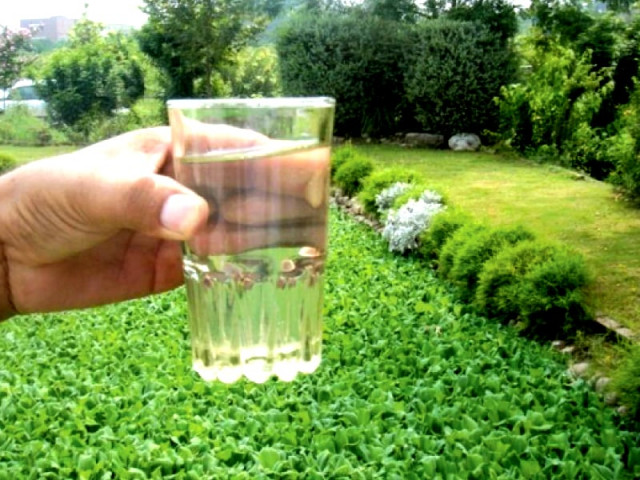River Ravi Commission: Experts propose bioremediation site
Subcommittee’s report backs pilot wastewater treatment facility at Babu Sabu modelled on two sites in Islamabad.

A subcommittee of the River Ravi Commission, which is tasked with finding a way to clean up the watercourse, has suggested that a bioremediation project based on constructed wetlands be built in Lahore.
On December 7, the Lahore High Court’s Green Bench directed the commission to publish the subcommittee’s report on indigenous wastewater technologies on the websites of the World Wide Fund for Nature Pakistan (WWF-P), the LHC, the Environment Protection Department (EPD) and the Water and Sanitation Agency (Wasa), so members of the public could comment on it before the next hearing due on January 13. The report has not been published on the websites, but a copy has been obtained by The Express Tribune.
Members of the subcommittee visited two bioremediation sites in Islamabad and waste stabilisation ponds in Faisalabad in August to assess which was a better way to treat wastewater.
They found the Bioremediation Garden and Bioremediation Orchard in Islamabad to be the most efficient and cost-effective at treating wastewater and suggested that a 50-acre site be set up at Babu Sabu for the treatment of 10 cusecs to demonstrate its use.
Analysis of the treated water from the plants in Islamabad showed that at the former sites, the biochemical oxygen demand (BOD) and chemical oxygen demand (COD) had been reduced by 83 per cent and 86 per cent respectively (BOD and COD are measures of pollution in water), bringing the quality of water in line with the National Environmental Quality Standards.
Meanwhile, the waste stabilisation ponds reduced the BOD and COD by 55 per cent and 53 per cent, leaving the treated water still unfit for the purposes of irrigation. They also take up more space than the bioremediation sites.
The 50-acre pilot site at Babu Sabu, if it is built, would cost around Rs42.65 million to build and clean 10 cusecs of water. Lahore currently produces 1,800 cusecs of wastewater a day.
River Ravi Commission Chairman Dr Kausar Abduallah Malik welcomed the LHC’s direction to publish the report. “How many public hearings does one see actually benefit a project of public interest, such as a new highway or flyover? Suggestions from members of the public are welcome and may help improve the project. It is a basic procedure with all big projects in the democracies of the world,” he said.

Malik said that if the pilot project is successful, more artificial wetlands could be built along the banks of the Ravi. He said that the sites did not require a lot of technology, was cost-effective, and could even bring in revenue in the form of eco-tourism.

Dr Ejaz Ahmad of WWF-Pakistan, who was part of the subcommittee, said that bioremediation sites were more suited to Lahore than Islamabad. “The duration of the optimum temperature for functioning of microbes in a bioremediation pond is longer in Lahore than in Islamabad, which may make it more effective for Lahore,” he said.
Ahmad said if work on the bioremediation site at Babu Sabu started in February, it would start functioning in three to six months. However, the site would not fully mature for two to three years, he said.
River Ravi Commission coordinator Sohail Ali Naqvi said if the LHC approved the project, the commission would ask the National Agricultural Research Centre, which is in charge of the Bioremediation Garden and Bioremediation Orchard in Islamabad, to provide consultation services. Wasa, said Naqvi, had already agreed to provide the land for the pilot plant.

The commission has also formed a review committee to conduct a technical examination of a feasibility report, being prepared by Wasa and the Japanese International Cooperation Agency (JICA), for the establishment of waste stabilisation ponds at Mehmood Booti. He said the RRC was also preparing for a seminar on the topic of converting waste into energy. The possibility of land formerly reserved for a wastewater treatment plant, which was to be built with French assistance, being used instead for more bioremediation sites was also being discussed.
Treating wastewater
Bioremediation is the use of micro-organism metabolism, plants and enzymes to remove pollutants from water.

Constructed wetlands are man-made wetlands used to remove various types of pollutants present in wastewater. They are constructed to recreate the structure and functions of natural wetlands. They possess a rich microbial community to effect the biochemical transformation of pollutants; they are biologically productive and self-sustaining.
Stabilisation ponds consist of shallow man-made basins comprising a single or several series of anaerobic, facultative or maturation ponds. The primary treatment takes place in the anaerobic pond, which is mainly designed for removing suspended solids, and some of the soluble element of organic matter (BOD). In the facultative pond, most of the remaining BOD is removed through the coordinated activity of algae and heterotrophic bacteria.
*These definitions are taken from the report of the subcommittee of the River Ravi Commission.
Published in The Express Tribune, December 12th, 2012.



















COMMENTS
Comments are moderated and generally will be posted if they are on-topic and not abusive.
For more information, please see our Comments FAQ